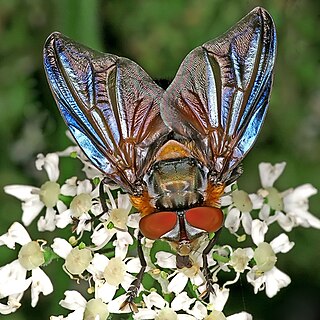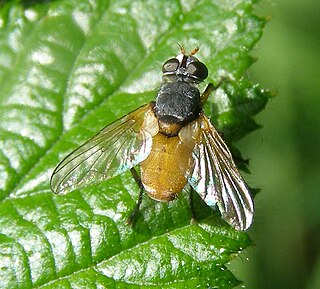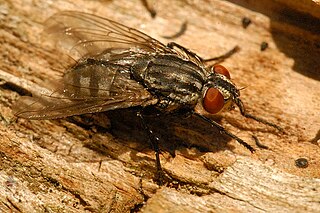
The Bibionomorpha are an infraorder of the suborder Nematocera. One of its constituent families, the Anisopodidae, is the presumed sister taxon to the entire suborder Brachycera. Several of the remaining families in the infraorder are former subfamilies of the Mycetophilidae, which has been recently subdivided. The family Axymyiidae has recently been removed from the Bibionomorpha to its own infraorder Axymyiomorpha.

The Nematocera are a suborder of elongated flies with thin, segmented antennae and mostly aquatic larvae. This group is paraphyletic and contains all flies but species from suborder Brachycera, which includes more commonly known species such as the housefly or the common fruit fly. The equivalent clade to Nematocera is the whole Diptera, with Brachycera as a subclade. Families in Nematocera include mosquitoes, crane flies, gnats, black flies, and multiple families commonly known as midges. The Nematocera typically have fairly long, fine, finely-jointed antennae. In many species, such as most mosquitoes, the female antennae are more or less threadlike, but the males have spectacularly plumose antennae.

Boris Borisovich Rohdendorf was a Soviet entomologist and curator at the Zoological Museum at the Moscow University. He attained the position of head of the Laboratory of Arthropods, Paleontological Institute, Russian Academy of Sciences, Academy of Sciences of the Soviet Union in Moscow. A student of Andrey Martynov, he was a prolific taxonomist who described numerous new taxa, including fossil Diptera, and published important syntheses on fossil insects. His work is being extensively revised by the current generation of Russian paleoentomologists.

Nemestrinidae, or tangle-veined flies is a family of flies in the superfamily Nemestrinoidea, closely related to Acroceridae. The family is small but distributed worldwide, with about 300 species in 34 genera. Larvae are endoparasitoids of either grasshoppers (Trichopsideinae) or scarab beetles (Hirmoneurinae). Some are considered important in the control of grasshopper populations. Adults are often observed on flowers.

Sarcophaga is a genus of true flies and the type genus of the flesh-fly family (Sarcophagidae). The members of this cosmopolitan genus are frequently known as common flesh flies.

Sciaroidea is a superfamily in the infraorder Bibionomorpha. There are about 16 families and more than 15,000 described species in Sciaroidea. Most of its constituent families are various gnats.

Gymnosoma is a genus of flies in the family Tachinidae.
Palesisa is a genus of flies in the family Tachinidae.
Pandelleia is a genus of flies in the family Tachinidae.

Gymnosoma clavatum is a species of tachinid flies in the genus Gymnosoma of the family Tachinidae.

Gonia is a genus of flies in the family Tachinidae.

Phasiinae is a subfamily of flies in the family Tachinidae. Except for the small tribe Strongygastrini members of this subfamily attack only Heteroptera.

Catharosiini is a tribe of flies in the family Tachinidae, containing two genera. Catharosia is a genus of small flies, less than 2 mm in length, and contains about 12 species. Stackelbergomyia is a monotypic genus found in the Palearctic.
Gymnosoma desertorum is a Palaearctic species of fly in the family Tachinidae.

Subclytia is a genus of flies in the family Tachinidae.
Senotainia is a genus of satellite flies in the family Sarcophagidae. There are more than 70 described species in Senotainia.

Paramacronychiinae is a subfamily of flesh flies.

Brachicoma is a genus of true flies in the family Sarcophagidae.
Pollenia viatica is a species of cluster fly in the family Polleniidae.













